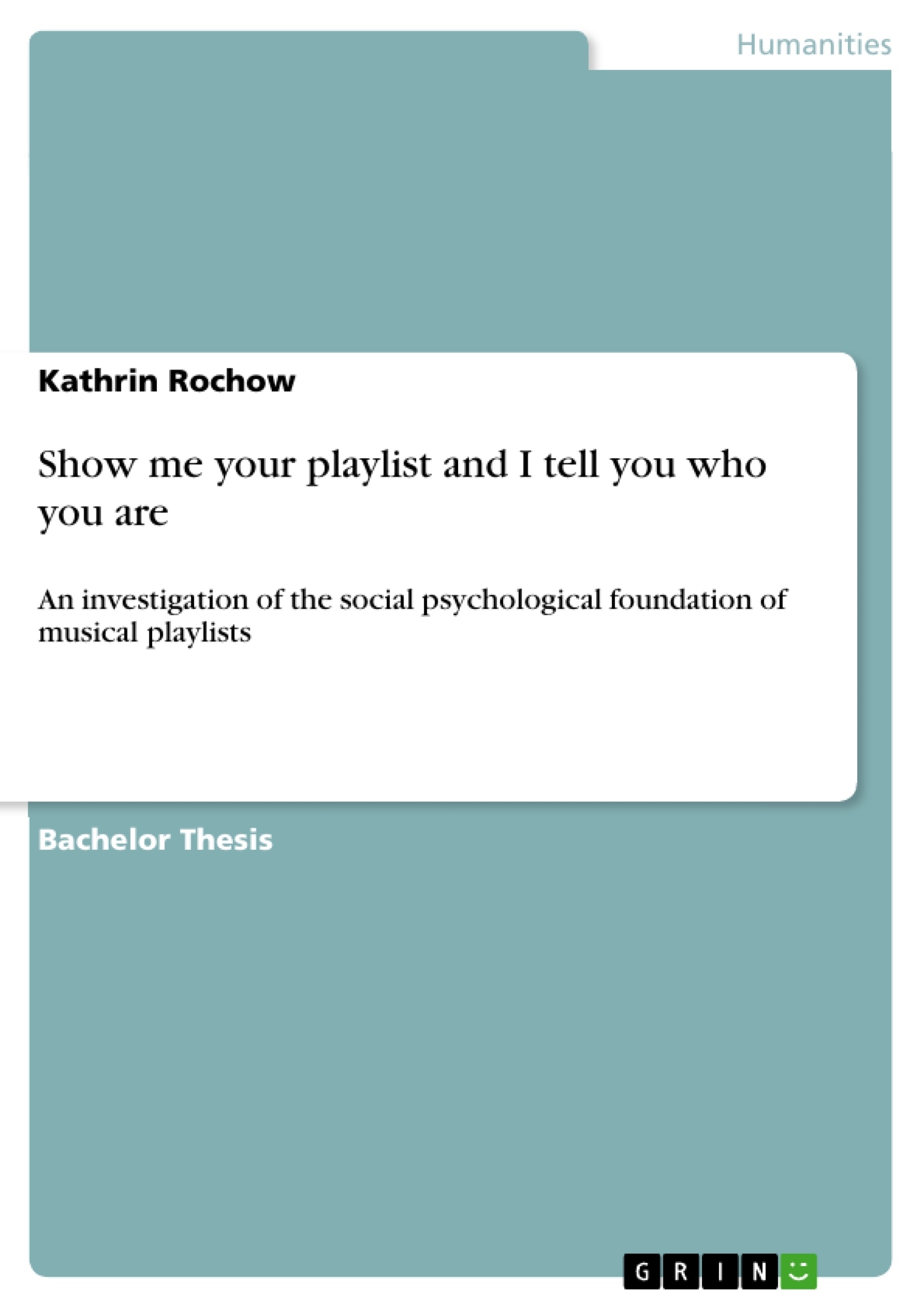In the age of social networking and music streaming, playlists are a common tool for organizing, sharing or exchanging music in the digital realm. Most research, however, emphasizes mainly political, legal, and ethical constraints of music sharing practices yet, neglects their social impact.
Thus, this paper investigates the social-psychological foundation of the playlist and analyses its functionality in establishing social relations and communication. Following the theories of Cooley, Mead, Simmel and Solomon, I conducted and analysed interviews with young Swedish men and women, in which they talked about their experiences and attitudes towards playlists. Moreover, all participants compiled their own personal playlist, based on certain personality traits, which were aimed to be recognized by the others during the focus group discussion. The analysis of the data yields the following conclusions: The playlist is a social object, facilitating new forms of communication. The social nature of the playlist is based on the transformation from objective- into subjective culture. By internalizing new technologies, such as the playlist, objects gain social value, thus mere musical content becomes a social form. It is through sharing and exchanging musical compilations that the playlist, as a social form, serves as a vehicle or medium, facilitating new forms of sociation and communication. The communicative function of the playlist is due to its construction through emotions as uniquely subjective judgements, based on the “I” as an emotional self-feeling. Thus, musical compilations take part in the self-construction process, and can serve as a tool for the symbolic expression of the self.
Moreover, the analysis points out that there are differences in how well certain parts of the self can be communicated by a playlist. Emotional expressions of the self are translated into particular universal music patterns most successfully. Furthermore, the analysis shows that some people like to browse through the playlists of others and judge them thereupon, which results in some type of musical voyeurism, termed “playlistism.” In conclusion, I argue that the musical playlist is both, socially implicated and socially implicating,
Inhaltsverzeichnis (Table of Contents)
- INTRODUCTION
- Purpose and the question of issue
- Prior Research – what is music sociology and why is it important?
- THEORETICAL FRAMEWORK
- George Herbert Mead and Charles Horton Cooley
- Key Concepts
- The concept of self
- The concept of medium
- The emotional foundation of musical preferences
- From mix-tape to playlist
- METHOD
- The gathering of data
- Limitations
- RESULT AND ANALYSIS
- Analysing the playlist
- The process of data analysis
- The "I"-construction of a playlist
- The playlist as a medium and social phenomenon
- Interpreting playlists – listening to the sound of the self
Zielsetzung und Themenschwerpunkte (Objectives and Key Themes)
This paper examines the social and psychological underpinnings of music playlists in the context of social networking and music streaming. It explores the playlist's functionality in establishing social connections and communication, moving beyond the predominant focus on political, legal, and ethical aspects of music sharing. The study analyzes interview data from young Swedish individuals to understand their experiences and attitudes towards playlists.
- The social nature of the playlist
- The playlist as a medium for social interaction
- The role of emotion in playlist construction
- The self-expression and identity formation through playlists
- The phenomenon of "playlistism" and the social implications of sharing and browsing playlists
Zusammenfassung der Kapitel (Chapter Summaries)
- INTRODUCTION: This chapter sets the stage for the research by introducing the purpose and the question of issue surrounding music playlists. It explores the existing research in music sociology and highlights the importance of studying music sharing practices in the digital age.
- THEORETICAL FRAMEWORK: This chapter lays out the theoretical framework underpinning the research. It introduces the key concepts of self and medium from the work of George Herbert Mead and Charles Horton Cooley. The chapter explores the role of emotion in musical preferences, examining the transition from mix-tapes to playlists in the context of changing cultural landscapes.
- METHOD: This chapter details the research methodology employed in the study. It describes the data collection methods used and the limitations of the study.
- RESULT AND ANALYSIS: This chapter presents the results of the analysis of the data collected from the interviews. It examines the social construction of playlists, the role of the "I" in playlist creation, and the playlist as a medium for communication and social interaction. The chapter also explores the phenomenon of "playlistism" and how listening to others' playlists can be a form of musical voyeurism.
Schlüsselwörter (Keywords)
The key themes and concepts explored in this paper include social psychology, music sociology, digital culture, social networking, music streaming, playlist, communication, sociation, self-expression, identity formation, and emotion. The study focuses on the social and psychological implications of music playlists, highlighting their role in establishing social connections and communication in the contemporary digital landscape.
How do playlists function as social objects?
Playlists facilitate new forms of communication by internalizing technology, transforming musical content into a medium for social interaction and sociation.
What is "playlistism"?
The term refers to a form of musical voyeurism where individuals browse and judge others based on their public musical compilations.
How are playlists related to identity formation?
Musical compilations serve as a tool for the symbolic expression of the self, allowing individuals to construct and communicate their "I" through emotional judgments.
Can emotions be effectively communicated through music patterns?
Yes, the research shows that emotional expressions of the self are often successfully translated into universal music patterns recognized by others.
What is the transition from mix-tape to playlist?
The transition represents a shift from physical to digital culture, where the social value of shared music remains but the medium of exchange evolves with networking technologies.



